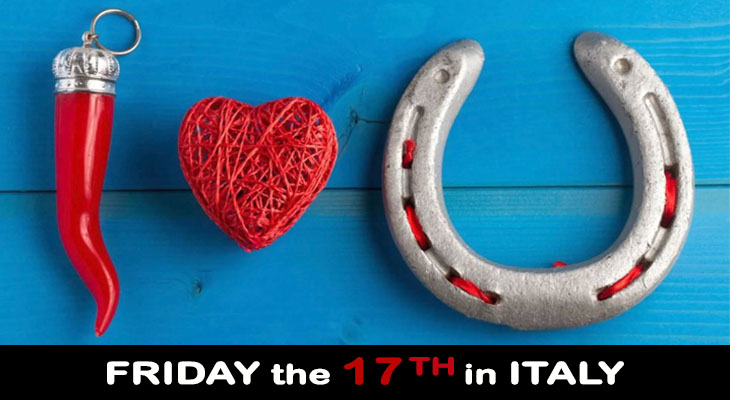Throughout Italy, from North to South, there is one day which instils fear in the Italian population: Friday the 17th. To really understand this phenomena, we need to look back at its ancient origins.

The most superstitious of Italians experience a significant amount of stress when the 17th appears on the calendar, and even more so when it falls on a Friday. Some go as far as to make themselves ill so they can stay at home. For the more courageous, they still remain cautious when carrying out their daily business, through fear of breaking a leg, or something worse.
Friday and The Number 17
Combining Friday and the number 17 is synonymous with bad luck in Italy! This number finds its roots in the Roman language; in Roman numerals, it is written as “XVII.” If we rearrange the order of these roman numerals, we obtain “VIXI.” In Latin, this translates as “I have lived,” an expression associated with death.
In tombstones in Italian cemeteries, the inscription XIVI can still be seen today. In Christian tradition, Friday was the day of Jesus’ crucifixion, which in itself conjures up a certain amount of sorrow. Consequently, in Italy, the combination of a Friday and the number 17 is doubly doused in superstition.
Superstitions Surrounding The Numbers 13 and 17
The misfortune associated with the number 17 is typically Italian and is intrinsically linked to Roman history.
As for the 13th, it is associated with Christ’s last supper! Judas, the 13th guest at Christ’s last supper, betrayed Jesus for thirty pieces of silver. The crucifixion of Jesus then took place on a Friday. Obviously, as in many other countries, the number 13 is also considered an unlucky number in Italy.
Heptacaidecaphobia
There is actually a word to describe the panic and fear surrounding the number 17! The term heptacaidecaphobia is a derivative of the Greek language and means both 17 and phobia. In Greece, the number 17 is also considered unlucky; just like in Italy, it is synonymous with misfortune.
In ancient Greece, Pythagoras followers hated the 17th! According to their beliefs, it created an imbalance between the numbers 16 and 18, which are representations of quadrilaterals (4×4 and 3×6).
The Great Flood of The 17th Day
According to the Old Testament, as recorded in Genesis, the Great Flood began on the 17th day of the second month. However, the most widespread cause of the superstition surrounding the number 17 is linked to how it is written in Roman numerals: XVII – this is associated with the anagram VIXI, which means “I have lived”, hence implying that it is time to die.
The Battle of The Teutoburg Forest
According to historians, the 17th is sometimes associated with the Battle of Teutoburg Forest in 9 AD. This battle was one of the greatest defeats of the Roman Empire against the Germans – three Roman legions, the XVII, XVII and XIX, were completely wiped out. XVII (17) in particular will always be considered a cursed number. Indeed, it was the first legion taken by storm during the bloody clashes between German and Roman soldiers.
The Battle of Teutoburg Forest is also known as the Varus Battle. During the clashes, a combined force of German tributes succeeded in annihilating a Roman army made up of three legions of 15,000 soldiers, 10% of the total Roman army. These legions, the XVII, XVIII and XIX of the Roman Empire’s mighty army, were a source of pride during many Roman conquests. For Rome, this loss had a profound impact. Moreover, since the Teutoburg Forest tragedy, no subsequent legion has worn the numbers 17, 18 or 19.
The Neapolitan Grimace
In southern Italy, under Neapolitan leadership, the 17th is associated with bad luck and ‘La Smorfia’. The term “Smorfia” is common in Naples and signifies a kind of facial expression that can make you feel uncomfortable. In Naples, when anyone announces anything to do with the 17th, people make a Smorfia.

Cornucopia
In Italy, to protect oneself from evil and superstition, it is commonplace to carry a charm in the shape of a cornucopia. We can also see them in restaurants and at the entrance to houses.
The Italian cornucopia is known as a “Cornicello” and takes the shape of a Sicilian red pepper. In southern Italy, just like in Sicily, red peppers are used to protect against the evil eye. Sometimes worn as jewellery, their dimensions vary.

On Friday the 17th, many Italians throughout Italy carry a red pepper with them. For the superstitious, it is the best way to avoid experiencing bad luck. In any case, in Naples, it is not a cliché.
Telephone Calls
On the 17th of each month, Italians avoid making phone calls! Indeed, you really need to have a good reason to dare call someone on this special day. If you’re unfortunate enough to call an Italian friend on the 17th day, without good reason, don’t be surprised if you get a strange answer.
17 – A Deliberately Forgotten Number!
In Italian cities, the tallest buildings do not have a 17th floor. Above the 16th floor, the numbering automatically passes to the 18th floor. The same goes for Alitalia planes! There is no 17th row of seats. In hotels, superstition also has its place – you will never find room number 17!